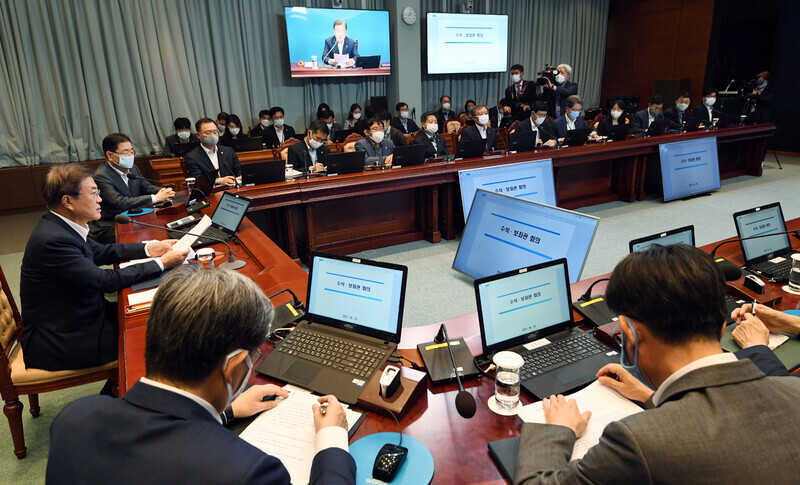hankyoreh
Links to other country sites 다른 나라 사이트 링크
Blue House criticizes Japan’s opposition to S. Korea’s inclusion in expanded G7

On June 29, the Blue House expressed strong displeasure with the Japanese government for making negative comments about South Korea attending the G7 summit. This appears to be calculated criticism of Tokyo for dragging out its export controls for a year now and for stubbornly obstructing the Korean Peninsula peace process, as recounted in the memoir by former White House National Security Advisor John Bolton.
“It’s shameless for the Japanese government to attempt to obstruct President Moon Jae-in’s attendance at an event to which he was formally invited. This is unthinkable behavior from our neighbor,” said a high-ranking official at the Blue House.
“It’s very important to maintain the G7 framework,” Chief Cabinet Secretary Yoshihide Suga said during the daily press briefing on Monday morning, expressing Japan’s official position. His comments represent Japan’s opposition to an expanded G7 summit that would include South Korea. Suga did not respond to a question about whether the Japanese government had conveyed this position to the US.
Kyodo News reported the previous day that the Japanese government had communicated to the US that South Korea takes a different approach to North Korea and China than the G7 and that the current G7 framework needs to be maintained. During an NHK broadcast the same day, Foreign Minister Motegi Toshimitsu said he thinks “the overall consensus is on maintaining the G7 framework.”
The Blue House’s response reflects the sense that the time has come to curb Japan’s behavior. “The Japanese government blocked Korean economic development with its export control measures on materials, parts, and equipment a year ago, and Bolton’s memoir showed that [Japan] has obstructed peace on the Korean Peninsula,” the high-ranking official said.
This official also expressed frustration with Japan’s refusal to engage in working-level negotiations about the export controls, using the COVID-19 pandemic as an excuse. Japan could have taken part in a video conference if it had so desired, but there’s no evidence of its sincerity, the official said.
Another factor behind the South Korean government’s response appears to have been Japan’s distortion of historical truth, including its failure to publicize the forced labor that took place at the coal mines at Hashima Island (also called Battleship Island), as it had promised to do when the mines were added to UNESCO’s world heritage registry. Japan has also been unhappy about South Korean Trade Minister Yoo Myung-hee’s candidacy for the secretary-general of the World Trade Organization (WTO).
The Japanese government’s adherence to its strategy of picking fights with South Korea leads some to think that the two countries’ intelligence-sharing pact, known as GSOMIA, is unlikely to be renewed. While withdrawing from the pact would impact American interests, Seoul may find it challenging to extend the pact given anti-Japanese sentiment in the country. The deadline for providing notification about GSOMIA renewal is Aug. 23.
“The GSOMIA issue requires a wait-and-see approach,” the high-ranking Blue House official said.
By Seong Yeon-cheol and Kim So-youn, staff reporters
Please direct comments or questions to [english@hani.co.kr]

Editorial・opinion
![[Column] Season 2 of special prosecutor probe may be coming to Korea soon [Column] Season 2 of special prosecutor probe may be coming to Korea soon](https://flexible.img.hani.co.kr/flexible/normal/500/300/imgdb/original/2024/0426/3317141030699447.jpg) [Column] Season 2 of special prosecutor probe may be coming to Korea soon
[Column] Season 2 of special prosecutor probe may be coming to Korea soon![[Column] Park Geun-hye déjà vu in Yoon Suk-yeol [Column] Park Geun-hye déjà vu in Yoon Suk-yeol](https://flexible.img.hani.co.kr/flexible/normal/500/300/imgdb/original/2024/0424/651713945113788.jpg) [Column] Park Geun-hye déjà vu in Yoon Suk-yeol
[Column] Park Geun-hye déjà vu in Yoon Suk-yeol- [Editorial] New weight of N. Korea’s nuclear threats makes dialogue all the more urgent
- [Guest essay] The real reason Korea’s new right wants to dub Rhee a founding father
- [Column] ‘Choson’: Is it time we start referring to N. Korea in its own terms?
- [Editorial] Japan’s rewriting of history with Korea has gone too far
- [Column] The president’s questionable capacity for dialogue
- [Column] Are chaebol firms just pizza pies for families to divvy up as they please?
- [Column] Has Korea, too, crossed the Rubicon on China?
- [Correspondent’s column] In Japan’s alliance with US, echoes of its past alliances with UK
Most viewed articles
- 1No good, very bad game for Korea puts it out of Olympics for first time since 1988
- 2[Column] Season 2 of special prosecutor probe may be coming to Korea soon
- 3Korea’s 1.3% growth in Q1 signals ‘textbook’ return to growth, says government
- 4‘We must say no’: Seoul defense chief on Korean, USFK involvement in hypothetical Taiwan crisis
- 5Is N. Korea threatening to test nukes in response to possible new US-led sanctions body?
- 6Division commander ordered troops to enter raging flood waters before Marine died, survivor says
- 7[Column] ‘Choson’: Is it time we start referring to N. Korea in its own terms?
- 8Will NewJeans end up collateral damage in internal feud at K-pop juggernaut Hybe?
- 9Korea sees more deaths than births for 52nd consecutive month in February
- 10[Editorial] Korea’s surprise Q1 growth requires objective assessment, not blind fanfare